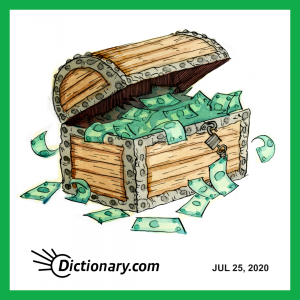Word of the Day
scattergood
noun
a person who spends possessions or money extravagantly or wastefully; spendthrift.
More about scattergood
The rare noun scattergood is a compound of the verb scatter and the noun good in the sense “possessions, personal property” (the plural form goods is the usual, modern form). An early, pungent citation of scattergood appears in the works of a 17th-century Anglican priest, William Brough, “If the first heir be not a Scattergood, the third is commonly a Lose-all” (spelling slightly modernized). Scattergood entered English in the second half of the 16th century.
how is scattergood used?
they are a pleasant couple, but it would be folly to bequeath the whole of my estate to a pair of such scattergoods.
And now, my lords, there is that young scattergood the Laird of Bucklaw’s fine to be disposed upon. I suppose it goes to my Lord Treasurer?
scattergood


anfractuous
adjective
characterized by windings and turnings; sinuous; circuitous: an anfractuous path.
More about anfractuous
Anfractuous ultimately comes from the Late Latin adjective ānfrāctuōsus, a term in rhetoric meaning “roundabout, prolix,” and first used by St. Augustine of Hippo in one of his sermons. Ānfrāctuōsus is a derivative of the noun ānfrāctus (also āmfrāctus) “a bend, curve, circular motion, digression, recurrence,” formed by the prefix am-, an-, a rare variant of ambi– “both, around, about,” and a derivative of the verb frangere “to break, shatter, smash.” Anfractuous entered English in the early 15th century.
how is anfractuous used?
Then, as the road resumed its anfractuous course, clinging to the extreme margin of this tumbled and chaotic coast, the fun began.
Chavis endured a bumpy, anfractuous trip …. He started with a turbulent flight from Syracuse, where the Pawtucket Red Sox were stationed, to Detroit. Then another flight from Detroit to Tampa.
anfractuous


coffers
plural noun
funds, especially of a government or corporation.
More about coffers
English coffers, “treasury, funds,” is the plural of coffer, “box, chest (for valuables).” The Middle English cofre (and coffre, coffer) had the same senses in the singular and plural. Middle English cofre comes from Old French cofre, from Latin cophinus “basket, hamper,” from Greek kóphinos “big basket; unit of measure.” Cophinus, going the easy way, yields coffin in English via Old French coffin “basket; coffer; sarcophagus.” (Latin ph from Greek words frequently becomes f in the Romance languages.) Cophinus, going the hard way, becomes cophn(o); the n then dissimilates to r, cofn(o) becoming cofre, just as Latin Londinium “London” becomes Londn(ium), the second n dissimilating to Londr- (Londres in Modern French). Coffers entered English in the 13th century.

how is coffers used?
For decades, American presidential campaigns have churned out enormous quantities of swag—$5 buttons, $15 mugs, $75 guacamole bowls—to promote candidates, fill campaign coffers and gather sophisticated data about supporters.
coffers





